Notes from Easton Mountain
by Perry Brass
I was able to attend the Gay Spirit Gathering, held at Easton Mountain Retreat, in upstate New York, near Troy, from Sunday evening, October 29, until Wednesday afternoon, November 1.
The gathering was actually a “sequel” to the larger Gay Men’s Spirit Culture Summit held in Garrison, NY, two years earlier; but this gathering was smaller, with about 35 participants, and wonderfully intimate and moving. I took brief notes of some of the comments and quotes given during activities which often consisted simply of men talking about their involvement with spirituality, their communities, and other people like themselves. Some of these have speaker attributes, others do not.
“Gay does not have a monopoly on joy, but has a real nifty corner of it.” Tim Cooley, Easton Mountain
“The longing is the path. Heart connection is a concrete force we use. We’re all longing for something. There is a power in longing, compassion, and peace. Assertive is not being violent. I want to emulate the ferocity of flowers.” Joe Weston, California
“Have I given people a sense of their soul?” Harry Hay, just before his death, quoted by Dan Vera, Washington, DC
“The necessary beauty of their lives—our gift is to remind people of that.” Dan Vera
“I spend a lot of time in the world of shadows, that dark place of fear and power.” Rosey, New York
“I don’t believe in self-help. I believe in inhabiting the masks completely.” Rosey, New York
“Passion comes from holding my outrage and idealism together.” John Stasio, Easton Mountain
“Surrender to the truth of your own experiences . . . what drives me is the choicelessness of my life.” John Stasio
“I seek the company of my fellows because I know how dangerous the world we live in is.” John Stasio
“My passion comes from the strength to keep my innocence alive, and to honor that innocence in others.” Perry Brass, Bronx, NY
“My passion comes from knowing God loves me . . . Lead a full life, claim your spiritual heritage.” Michael Kelly, Easton Mountain, via Australia
"We all stand beside our own pool of tears.”
“This thing called the body, and using it to connect with desire makes me passionate.”
“Words—I’m passionate about things being said well. I act through the body. I’m passionate about healing through pleasure . . . To be alive in your body is to be awake in the world.” Don Shewey, New York, NY
“I had long-term short relationships. But I did not know what love was; I was not big enough to know the fullness of love.”
Thoughts of my own:
Structure is a point of entry into each other.
The problem of people who become conduits for the Eternal is that they become aware at some point of their own emptiness.
Statements from a panel on the future
of Gay Spirituality and the movement toward it:
Audio Links to each panelist’s talk are below each summation and will open in a separate window. Audio is in mp3 format and will take a few seconds to download.
 Toby Johnson (writer and therapist):
Toby Johnson (writer and therapist):
“We are part of the ‘new myth,’ a shift in consciousness. Gay consciousness sees the world from outside and above, since we don’t fit in. Homosexuality is a dynamic of psychology rather than of biology; a function of consciousness. The Gay Movement is in two forms: political and society; and gay spirituality, addressing ourselves directly.
“Let’s change each other.
“Homosexuality should be a spiritual gift. It is a dynamic of consciousness, and makes use of kindness and spirituality. We need to change our vision of homosexuality. Wake up the boddhisatvas!”
Toby Johnson’s Statement (mp3 audio) (first few words are missing, apologies)

Michael Cohen (therapist and Body Electric facilitator):
“I see lots of hungry men wanting information and permission to be in a body. Initiation is important; Body Electric is about initiation. The secret mission of Body Electric is to ‘crack open your heart,’ to make men fall in love with themselves again.”
Michael Cohen’s Full Statement (mp3 audio)
 Jay Michaelson (teacher and writer):
Jay Michaelson (teacher and writer):
“Gay spirituality is powerful, transformative, and limited. I am not interested in the ‘origins of homosexuality,’ the debate in pop culture. We need to bring our work out into the world.
“Are we the alternative to Western religion, or are we trying to make Western religion more open to us?
“Marketing is important to understand in the growing of the movement.”
Jay Michaelson’s Full Statement (mp3 audio)
 Duncan Teague
Duncan Teague
(performance poet and Afro-American spiritual leader):
“I want to acknowlege the ‘Lord,’ or the people who’ve made Easton possible. People are still struggling with spirituality, liberation, and consciousness. Church is home for Afro-Americans. We want to recreate a church where we can feel spiritual.
How many black gays have done Body Electric?
I’m a Unitarian because they support what I do.
“It’s about our relationships, and that white gay men exist in their own planet.
Katrina shifted the consciousness of this country. If Katrina had happened in Connecticut, wouldn’t things have been different?”
Duncan Teague’s Full Statement (mp3 audio)
 John Stasio (founder and director of Easton Mountain Retreat):
John Stasio (founder and director of Easton Mountain Retreat):
“I live in a rarified environment.
Each one of us has a dimension in our experience connected to a larger experience or community. The work of this movement is help us navigate in that inner world. I had an experience as a boy of being connected to the galaxy. It made religious rules have no reality. I had that religious experience at 17. At 19, in bed with man I was infatuated with, I had a vision of Jesus coming down from a picture in my room and entering a threesome with us. So helping people have a profound experience about themselves is what my work is all about. It is irresponsible of us to look at people who can’t help us—such as organized religion—instead of ourselves. The epidemic made us ask big questions about the meaning of life. Death is a profound teacher. We need to have rich, meaningful lives together. If we can support that, we can have a community together.
John Stasio’s Full Statement (mp3 audio)
More remarks:
“We need to be a source of action in the world.” Rosey
“In terms of historical moments, we, the community, haven’t had that much time. We have the resources to go further.” Chris Bartlett, Philadelphia, PA
“Not being ashamed is work, and transformative.”
“We’re winning; things cannot go back.” Toby Johnson
“Everyday something happens that tells me I am an oppressed person.” Harry Faddis, Easton Mountain
“There are people who need to receive the invitation to open spaces.” Dan Vera
“This is a fruit of grace that we can meet and be here.” Michael Kelly
“Ask yourself: What is the next right thing to do?" David Coleman
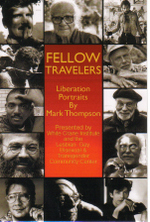 Mark Thompson’s "Fellow Travelers"
Mark Thompson’s "Fellow Travelers" 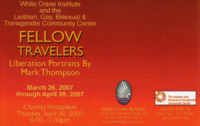 The show went up March 26th and has received an enthusiastic reception. If you haven’t been out to see this inspiring exhibit time is running out so get there while you still can.
The show went up March 26th and has received an enthusiastic reception. If you haven’t been out to see this inspiring exhibit time is running out so get there while you still can.


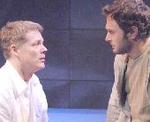
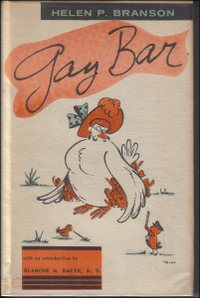
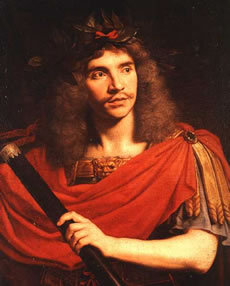 Today is the birthday of Molière (1622-1673).
Today is the birthday of Molière (1622-1673).



